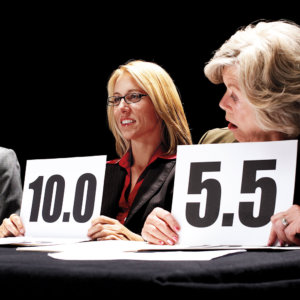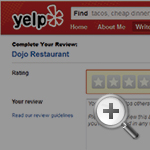The Problem With Online Ratings
Studies show that online ratings are one of the most trusted sources of consumer confidence in e-commerce decisions. But recent research suggests that they are systematically biased and easily manipulated.
A few months ago, I stopped in for a quick bite to eat at Dojo, a restaurant in New York City’s Greenwich Village. I had an idea of what I thought of the place. Of course I did — I ate there and experienced it for myself. The food was okay. The service was okay. On average, it was average.
So I went to rate the restaurant on Yelp with a strong idea of the star rating I would give it. I logged in, navigated to the page and clicked the button to write the review. I saw that, immediately to the right of where I would “click to rate,” a Yelp user named Shar H. was waxing poetic about Dojo’s “fresh and amazing, sweet and tart ginger dressing” — right under her bright red five-star rating.
I couldn’t help but be moved. I had thought the place deserved a three, but Shar had a point: As she put it, “the prices here are amazing!”
Her review moved me. And I gave the place a four.
As it turns out, my behavior is not uncommon. In fact, this type of social influence is dramatically biasing online ratings — one of the most trusted sources of consumer confidence in e-commerce decisions.
An Example of Social Influence

The Problem: Our Herd Instincts
In the digital age, we are inundated by other people’s opinions. We browse books on Amazon with awareness of how other customers liked (or disliked) a particular tome. On Expedia, we compare hotels based on user ratings. On YouTube, we can check out a video’s thumbs-up/thumbs-down score to help determine if it’s worth our time. We may even make serious decisions about medical professionals based in part on the feedback of prior patients.
For the most part, we have faith in these ratings and view them as trustworthy. A 2012 Nielsen report surveying more than 28,000 Internet users in 56 countries found that online consumer reviews are the second most-trusted source of brand information (after recommendations from friends and family).
References (12)
1. “Nielsen: Global Consumers’ Trust in ‘Earned’ Advertising Grows in Importance,” April 10, 2012, www.nielsen.com.
2. S. Bikhchandani, I. Welch and D.A. Hirshleifer, “A Theory of Fads, Fashion, Custom and Cultural Change as Informational Cascades,” Journal of Political Economy 100, no. 5 (October 1992): 992-1026 ; and M.J. Salganik, P.S. Dodds and D.J. Watts, “Experimental Study of Inequality and Unpredictability in an Artificial Cultural Market,” Science 311, no. 5762 (February 10, 2006): 854-856.


 View Exhibit
View Exhibit



Comments (6)
Samiul Islam
Raul Bustamante
David Engel
Hurriyet ilan Servisi
jklondon
rob schmidt